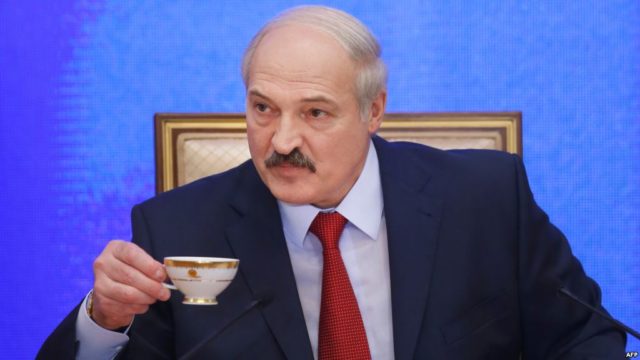
Are Moscow and the West Swapping Positions on Belarus?
Publication: Eurasia Daily Monitor Volume: 14 Issue: 10
By:

Since Alyaksandr Lukashenka became president of Belarus over two decades ago, Moscow has consistently viewed his country as its ally, difficult at times but one that, when the chips were down, would be in Russia’s corner. The West, meanwhile, has routinely denounced him as the “last dictator in Europe” and regarded the Belarusian state with similar disdain or at least indifference. But now there are intriguing indications that Russia and the West are progressively swapping their positions on Belarus, with Moscow viewing its Western neighbor as a threat and the West increasingly considering Belarus a possible ally against Russia.
The changes on the Russian side are more striking, but ultimately they may be less meaningful. On the one hand, they could simply be an escalation of the kind of exchanges between Moscow and Minsk that have become more heated since Vladimir Putin invaded Ukraine. Or on the other hand, they could be designed to set the stage for Moscow to orchestrate regime change in Belarus (see EDM, January 20)—especially if the Kremlin concludes that the new presidential administration in the United States accepts the idea of a Russian droit de regard over the former Soviet space.
The changes on the Western side are less prominent. Nonetheless, they may be more profound because they appear to reflect the growing understanding among security analysts in the US and elsewhere of the critical importance of Belarus. This is by virtue of both the country’s geographic location—Belarus after all, not Ukraine, lies between Moscow and Berlin—as well as the commitment of its leader and its people not to allow Russia to trample their rights, as it has done so often in the past.
Such a swapping of geopolitical perceptions, of course, could lead to changes in how Moscow and the West view many things in Belarus, including their attitude toward the democratic opposition. Moscow, which has been hostile to that group within Belarus, could suddenly become more positive; and the West, which has been its chief backer, could cool to the opposition just as it has in the past in other countries where the geopolitics of the regime became more important than the fate of democratic change.
And what is especially intriguing and quite possibly unexpected about all this now is that the new US administration, having forsworn the idea of promoting democracy abroad, might thus become more willing to back Minsk even as President Donald Trump’s relationship with Vladimir Putin continues to warm. Such a developing configuration could mean Belarus would play a larger role in East-West relations than ever before.
For now, such longer-term outcomes are necessarily speculative. Nonetheless, it is important to keep track of attitudes in Moscow and the West toward Belarus. In recent weeks, Russian analysts and commentators have stepped up their attacks on Belarus, Lukashenka and developments in Minsk that they see as antithetical to Moscow’s interests. These have included a series of attacks on key Belarusian institutions, such as important national security think tanks (Belaruspartisan.org, January 27). Russian attacks have also targeted Belarus’s purported increasing Westernization—implicit in what Russian writers inelegantly denounce as “the creeping Belarusianization” of Belarus (Regnum, January 23).
More interesting and potentially more important are intellectual shifts in the West that, so far, have received relatively little attention. One of those involves a recent war game organized in Warsaw by the US Potomac Foundation and the Casimir Pulaski Foundation. Its results remain secret, as they are being passed to both the US and Polish governments. But the comments of some of the participants to the media highlight just how much has changed in Western views on Belarus at least geopolitically (Belsat, January 28). Arseniy Sivitsky, the director of the Minsk Center for Strategic and Foreign Policy Research and the only Belarusian participant in the exercise, said that the game “demonstrated a change in the [West’s] attitude toward Belarus. Usually Belarus has been treated as a dependent Russian satellite.” But not this time.
The game, called “Hegemon,” was developed by Phil Peterson of the Potomac Foundation in order, in the words of his Polish counterpart, Zbigniew Pisarski, to challenge its participants to think anew about some old questions. Specifically, they pushed the participants to consider how the North Atlantic Treaty Organization (NATO) could respond if Moscow, continuing its aggressive course, overthrows Lukashenka and then uses Belarusian territory to launch attacks on Poland and the Baltic countries. The fact that Moscow would have to displace the Belarusian government in order to make use of Belarus, of course, suggests that Belarus today can hardly be viewed as Russia’s willing servant and satellite. Instead, it suggests that Belarus and the Belarusians, in the view of these Western analysts, could prove to be an ally against Russia in the event of such an invasion. That is a sea change in the Western estimation of this country and its role (Belsat, January 28).
Belsat noted that among those taking part in the “Hegemon” war game was retired US General Philip Breedlove, who was Supreme Allied Commander in Europe for NATO. The distinguished four-star general, the Belarusian outlet said, is now in Washington reporting to Congress and the Pentagon about this game.



